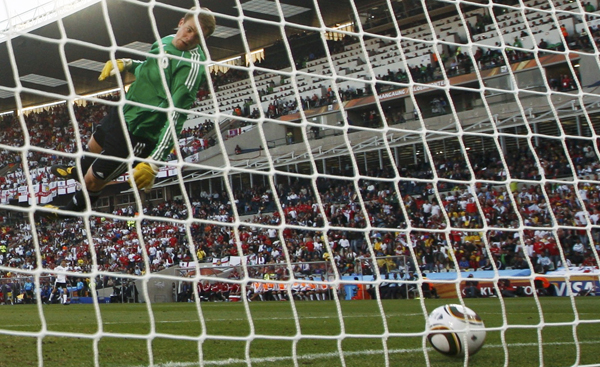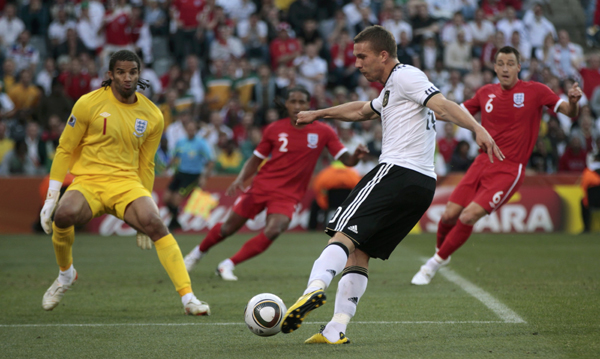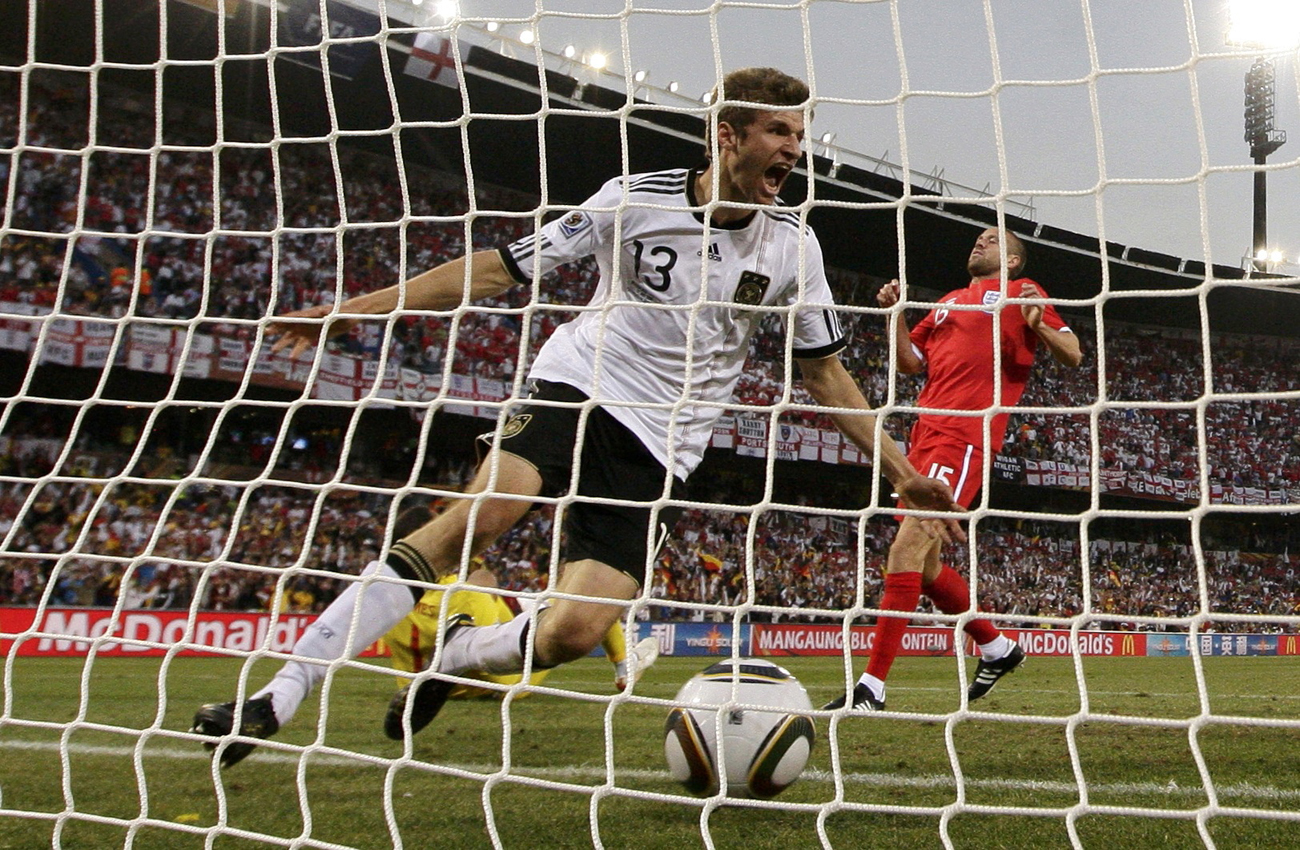But firstly – Lampard’s disallowed goal. It was a ridiculous decision, one which cast a rather ugly pall on what was a great football match. Lampard’s shot hit the upright, bounced a foot or two in the German goal, hit the upright again and bounced out. It was a brilliant goal, but apparently because the assistant referee didn’t see it, it was disallowed. How much lower should football sink before Fifa decide to introduce video technology into the officiating?
According to Sepp Blatter’s statement on the issue of introducing technology to football, “Fifa’s goal is to improve the quality of refereeing, making referees more professional and better prepared, and to assist referees as much as possible. This is also the reason why refereeing experiments (such as with additional referees or the role of the fourth official) will continue to be analysed, to see how referees can be supported.” Well, the level of professionalism we’ve seen in this World Cup is, quite frankly, appalling. The decider between which team stays on in the tournament and which team takes an early flight home should not be the referee or his assistants.

Photo: Germany's goalkeeper Manuel Neuer watches as the ball crosses the line during the 2010 World Cup second round soccer match against England at Free State stadium in Bloemfontein June 27, 2010. England were denied an equalising goal on Sunday when a Frank Lampard shot from 2O metres out hit the crossbar and dropped well over the line. REUTERS/Eddie Keogh
But the difference between the two sides was much more than that mistake. For one thing, Joachim Loew organised his team more intelligently. Bastian Schweinsteiger and Sami Khedira played a holding role deep within the German midfield, allowing Thomas Mueller, Mesut Ozil, Lukas Podolski and Miroslav Klose to wreak devastation on the England defence. The Germans 4-2-3-1 formation allowed them to control the midfield and to play a flowing game that let players to deploy themselves to any point on the field where they’d be most effective at any given moment. You simply had no idea where the front three Germans might turn up. Capello’s choice of the old-fashioned and static 4-4-2 formation kept the midfielders rigidly fixed to their positions, and there was a gap between the midfielders and the strikers.
There was also a gap between the England midfield players and the defenders. Klose often had the beating of John Terry and Matthew Upson, not only because he’s a tough player, but because the two centre backs were often left alone to defend. Not so with the Germans. The two holding midfielders always backtracked in defense to support their two central defenders.
Germany were also devastatingly brilliant in their counter-attacks. They flicked the ball from player to player very swiftly, and weren’t afraid to pass the ball right across the field if necessary. They never needed any more than three players to punish the England side.
Ozil was a major ace in the German squad. Not only does he have a delicate touch, he’s a very intelligent player who seems to be telepathically linked to the rest of his teammates, wherever he is on the field. He always seems to make the most effective choices when passing. Khedira and Schweinsteiger were also a revelation, as was Mueller, who scored a brace and the two Poles Lukas Podolski and Klose. Germany may not want to admit this, but the exclusion of Michael Ballack may have been quite a blessing. Not only is there a sense of playing for each other in the team, but it allows Ozil so much more freedom – something he may not have had, had the imposing German captain been in the team.
For England, this will be a very sorry trip home. Their side have simply not had a good showing, for all their individual talent and brilliance. What they might want to consider first is getting a coach who will allow his side to play a more flexible formation. They also need a coach who will not be intimidated by the English – we think Capello’s decision to continue play both Frank Lampard and Steven Gerrard in the same team is more about appeasing the supporters back home than a tactical move that would give England an edge. (Both Lampard and Gerrard do exactly the same thing in the side, and a clash of personalities is inevitable.)
Germany face either Argentina or Mexico in the quarter finals, and we wonder whether Diego Maradona’s men (we’re making an intelligent, if rather dangerous, guess about the outcome of the last 16 encounter between Argentina and Mexico here) will be smarter and tougher than the Germans. It will be a delicious game, whatever happens.
Here are this reporter’s notes:
Starting line-ups
Germany: Manuel Neuer; Philipp Lahm, Arne Friedrich, Per Mertesacker, Jerome Boateng, Thomas Mueller, Sami Khedira, Bastian Schweinsteiger, Lukas Podolski, Mesut Ozil, Miroslav Klose.
England: David James; Glen Johnson, Matthew Upson, John Terry, Ashley Cole, James Milner, Steven Gerrard, Frank Lampard, Gareth Barry, Jermain Defoe, Wayne Rooney.
Referee: Jorge Larrionda (Uruguay).
Man of the match
Thomas Mueller
First half
Only one change made to either side. Miroslav Klose starts in place of the injured Cacau. Or regains his rightful place in the line-up, I should say.
- 4th minute: David James makes his first save of the match. The shot came, perhaps inevitably, from Mesut Ozil.
- 10th minute: Germany break quickly, and momentarily have more men in the England half, but Klose wastes the opportunity by thumping the ball against an England defender.
Thomas Mueller goes down after a challenge from Ashley Cole, and gets roundly booed by the mostly British crowd.
- 15th minute: James gets a bit more work, scooping a cross by Philipp Lahm out of the air.
- 16th minute: so does Manuel Neuer, after a cross by Gareth Barry goes towards the poles.
- 16th minute: Sami Khedira shoots from way out, the ball going high.
- 18th minute: Free kick to England, after Bastian Schweinsteiger brings Lampard down illegally. The Chelsea man takes it, and smacks it against the gigantic German wall.
- 20th minute: Germany lead through a Miroslav Klose goal! Klose connects to a ball struck all the way back by Neuer, and beats off the two England centre backs to fire it past James.
- 23rd minute: Wayne Rooney drives the ball high and wide. That was a terrible effort by the England hit man.
- 25th minute: Gareth Barry’s first attempt is scooped up easily by Neuer.
England’s two central defenders have their hands full, and then some, with Klose.
- 27th minute: Germany almost break after England’s defender smacks the ball against the referee, Jorge Larrionda.
- 30th minute: Brilliant move from Ozil and Mueller to set Klose up for a shot, but James is up to the task this time.
- 31st minute: Jermain Defoe breaks away and headers over the poles. It wouldn’t have counted in any case: he was offside.
- 33rd minute: Germany are completely unstoppable at the moment. Mueller finds Podolski at the end of the England penalty area, and the German striker slots it past David James.

Photo: Germany's Lukas Podolski scores a goal past England's goalkeeper David James during the 2010 World Cup second round soccer match at Free State stadium in Bloemfontein June 27, 2010. REUTERS/Ina Fassbender
- 35th minute: Lampard jabs a cross in from Milner towards the German goal, but Neuer gets the barest of touches on it to deny England a goal.
- 36th minute: Klose almost scores again, after a ham-fisted England defence fails to clear a corner, allowing the German striker both time and room to get a shot away. Only James’s knee prevented a third goal for Germany.
- 37th minute: Oh, very well done to Matthew Upson, who beat Neuer.
- 38th minute: Lampard fires a shot in from distance, and beats Neuer with a terrific shot, but the goal is disallowed. That is insane. That was clearly a goal.
That was easily the worst officiating decision we’ve seen in this World Cup, and there have been several dreadful ones. The ball must have been half a metre into the goal.
Watch: Jeff Hurst's infamous goal from 1966
End of the first half.
Second half
- 47th minute: We’re off, and Freidrich gets a yellow card for fouling Defoe.
- 49th minute: Is Gerrard trying to win this game single-handedly? He tries to scamper past two defenders and fire in from an impossible angle.
- 51st minute: Friedrich gives away another free kick to England. Lampard takes it, and strikes the bar.
- 54th minute: Terry gives the ball away to Miroslav Klose, and the German striker makes a run down the flank but finds himself isolated on the side.
- 55th minute: Gerrard shoots tamely at Neuer. No problems at all for the keeper.
- 57th minute: Now it’s Germany’s turn to defend nervously. A Lahm back pass, intended for Neuer, almost falls to Defoe.
- 58th minute: Gerrard shoots wide again.
- 59th minute: Mueller gets all the time and space he needs to get a shot off. Sloppy defending by the England defenders, luckily for them Mueller’s shot was off.
- 61st minute: Neuer does well to reach out and snatch a low cross out of the air.
- 61st minute: James Milner almost gets a very promising shot off, his path blocked by Jerome Boateng.
It’s Germany who have their backs to the wall in this half.
- 62nd minute: Schweinsteiger’s shot is only inches wide of the goal.
- 63rd minute: Jerome Boateng tries his luck, but skewers his shot wide.
- 64th minute: Joe Cole comes on for Milner.
- 66th minute: Friedrich gives away another free kick. Lampard smacks the shot against the wall.
- 67th minute: Germany break swiftly from the free kick, and Mueller gets the shot away, completely beating James, who dives the wrong way. James got a bit of a touch on the ball but not enough to make the save.
- 68th minute: Mueller gets another chance to score again, but this time can’t find the target.
- 69th minute: England screw up another attack, and Germany once again break swiftly, this time Ozil making the move forward. Again, Mueller is in the right place at the right time, and scores.
- 71st minute: Defoe is brought off for Emile Heskey.
- 72nd minute: Klose makes way for Mario Gomez, and Mueller comes off for Piotr Trochowski.
- 75th minute: Johnson fouls Schweinsteiger and gives away a free kick.
England caught pushing too many men forward once may be poor, but twice is criminal.
- 79th minute: Gomez, the substitute, tries to sneak a shot in from an acute angle, but shoots it high.
- 81st minute: Gerrard tries again to close the deficit and is denied by a very good save by Neuer.
- 81st minute: Glen Johnson gets a yellow card for pulling Ozil down.
- 82nd minute: Ozil comes off for Stefan Kiessling.
- 86th minute: Johnson comes off, and Shaun Wright-Phillips comes on.
- 88th minute: Neuer blocks off a low shot from a corner.
- 89th minute: Lampard’s excellent shot is saved by Neuer.
End of the match. England are broken.
By Sipho Hlongwane
Photo: Germany's Thomas Mueller celebrates after scoring his team's fourth goal against England during a 2010 World Cup second round soccer match at Free State stadium in Bloemfontein June 27, 2010. REUTERS/Darren Staples





